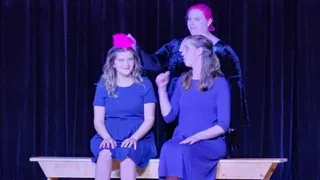February 7, 2014
Handicapping
Michael Cox READ TIME: 4 MIN.
Half way through the first act of "Handicapping," playing now through February 8 at The Factory Theatre, I found myself literally sitting on the edge of my seat, the front edge. I had to take a moment and think, Am I really that invested in what will happen to these characters?
Yes. I was.
Gambling is inherently dramatic subject matter, and the stakes are high as Ant (Kyle Blanchette), a father at too early an age, is betting his life savings on the hope that he has a future with his wife and child. He wants to start his own business in a dying industrial town in upstate New York, and though he hasn't had much good fortune in his life, he's been having some luck at off-track betting (OTB).
OTB is like a quick-loan store for gamblers. Without going to a racetrack, a bettor can walk into a storefront in a strip-mall and lay down a bet on a race they watch on a TV. Thanks to the brilliant scenic design by (Marc Ewart) gambling here has none of the mystique of the real racetracks. The harsh reality that surrounds that romantic image on the small screen in this room is palpable.
It's not like Ant doesn't have supporters. Misery loves company and the townies that lay their wagers along-side Ant seem to genuinely care about him, nevertheless everyone has their own agenda, and the hope of hitting it big trumps any other camaraderie.
Vin (Alex Roy) has little else in the world but his friendship with Ant; in fact, he's become almost completely reliant. Ant has always had this guy's back. Though he hides it well, the fear of losing Ant troubles Vin.
Professor Dunne (Laurie Singletary) lets us know early on that she's only here for research purposes. An intellectual woman in a place like this sticks out like a sore thumb, but she has statistical theories and she needs to collect data... or so she says.
Angie's (Jaclyn Johnson) motivation is simple; she's convinced Ant's relationship with his wife won't work, and she going to step up to the plate when the marriage crumbles.
The only person who doesn't seem to want anything from Ant is Terry (Gideon Bautista.) As the kid others used to pick-on in school, Terry just wants to be left alone. That won't happen, because Terry has something that everyone wants. Information. He has a habit of picking winners that is statistically spellbinding.
This show is worth seeing for its interesting characters and intricate plotting, but the design team has made the show a must see.
Enough cannot be said about Marc Ewart's set. He has perfectly integrated the Factory Theatre's own unique charm and appeal. So many designers fight this space in their designs, but Ewart integrates it. He does what all designers should do. He makes us say, I would not want to see this show in any other place -- even if the show had a million dollar budget.
The real merit of a lighting designer comes across in how they do naturalism. Here we seen the artists purest voice unencumbered by spectacle and effects. Chris Bocchiaro writes a story through light without ever letting his craft upstage the actual narrative.
We've come to expect such dazzling style from the man who evoked so many settings and haunting moods in "Hairy Tales." In these shows the settings are defined by the way they're illuminated, but Bocchiaro has to paint with subtler strokes in this play. And the way he structures each scene with inconspicuous fades, focus and color shows the skill of a true artist.
The performances started off a bit shaky the night I attended. Several times I was distinctly aware of people "acting." Performers tended to show their reactions rather than just listening to each other, and they seemed uncomfortable in their own skin. This was far more apparent in the characters that need to bear most of the action in the script.
Gideon Bautista's Terry was an exception. At no time did I think about the actor in his portrayal. I just though, "Who is this strange guy? What's his secret? How does he keep winning? Is he some kind of Rainman?" In other words, exactly what I was supposed to think about. The script and plotting are interesting enough that I stopped thinking about the acting after I'd moved up to the edge of my seat.
I'm told that this show was set to have "a run with an Equity theater in New Jersey," but the production company backed out because they considered the new plays too "financially risky." Fresh Ink proves that sometimes when you gamble you win.
"Handicapping"
Fresh Ink Theatre: http://freshinktheatre.com
Direct Box Office Link: http://goo.gl/8Re2kn
January 31 - February 8, 2014
$20 General Admission (no hidden fees online)
* Playwright's Night on February 6th
The Factory Theatre, 791 Tremont St., Boston, MA





